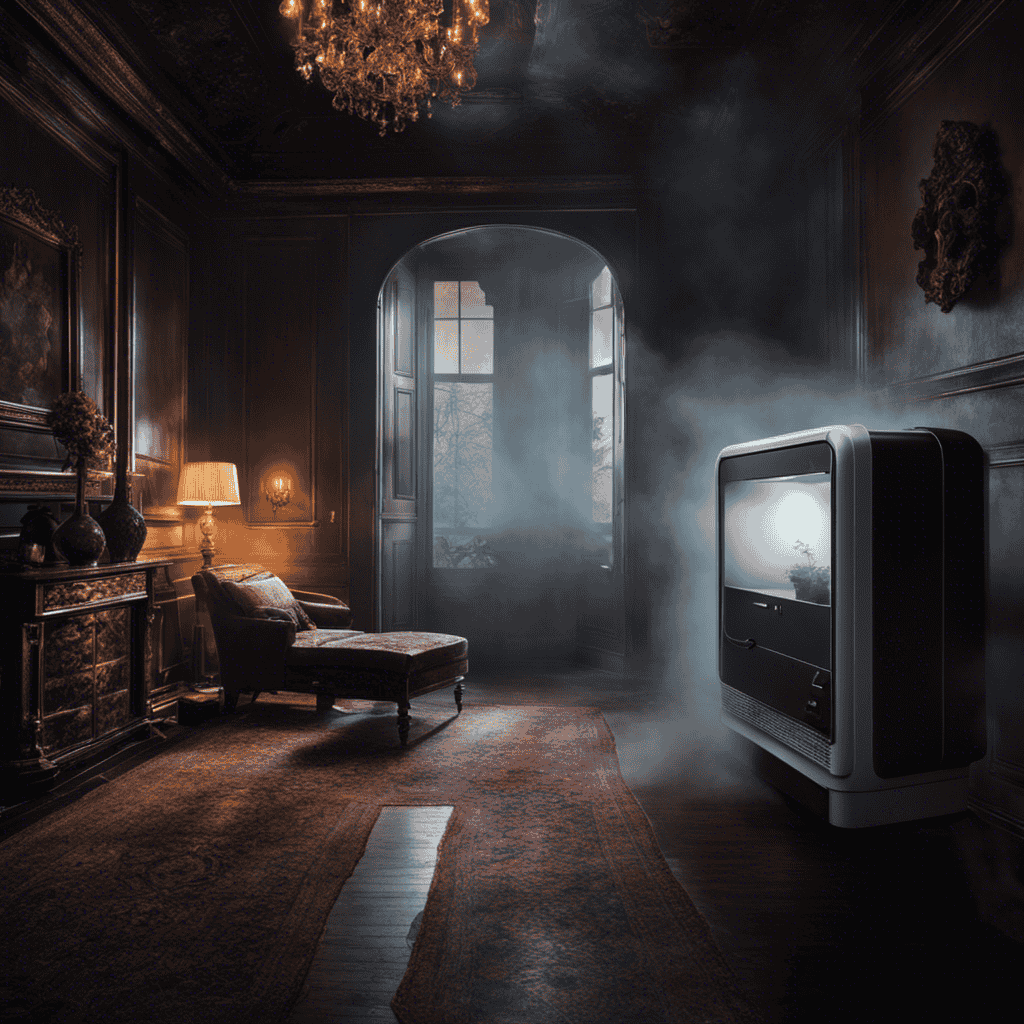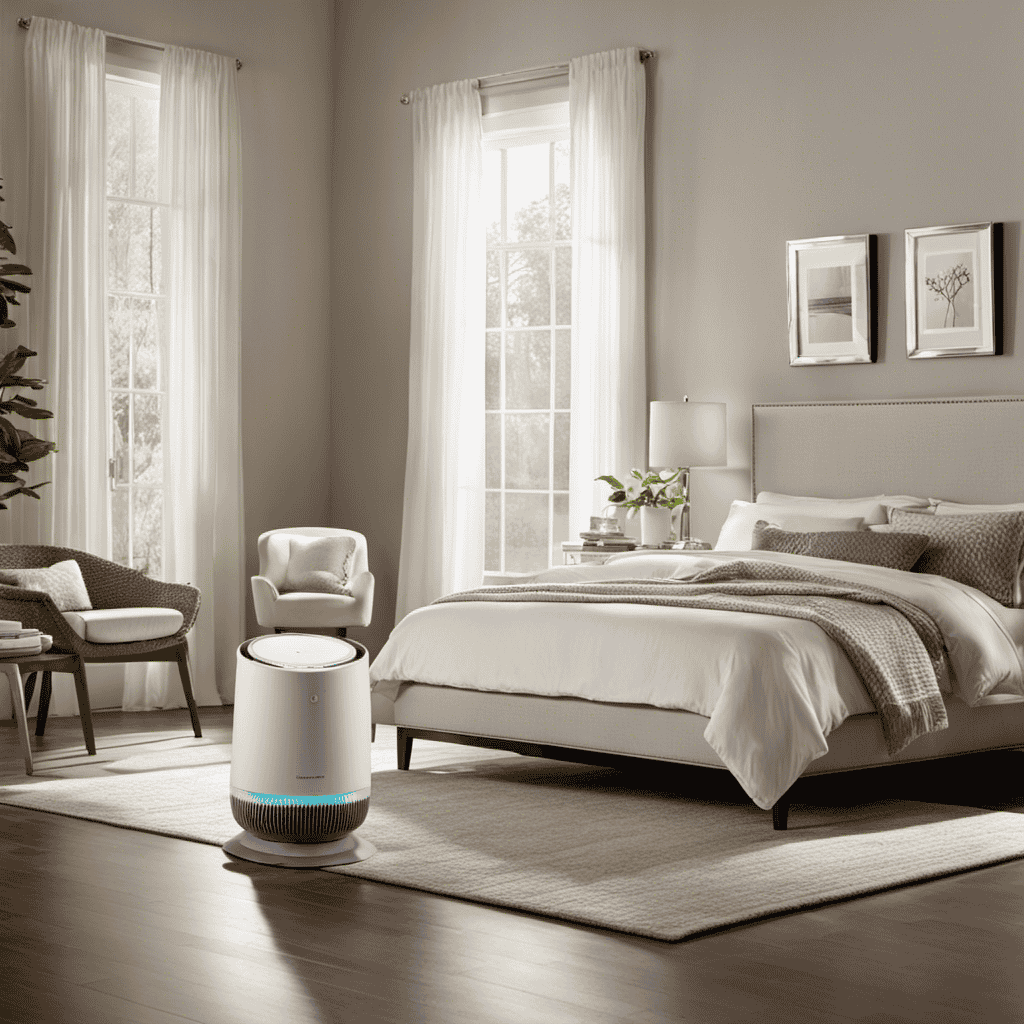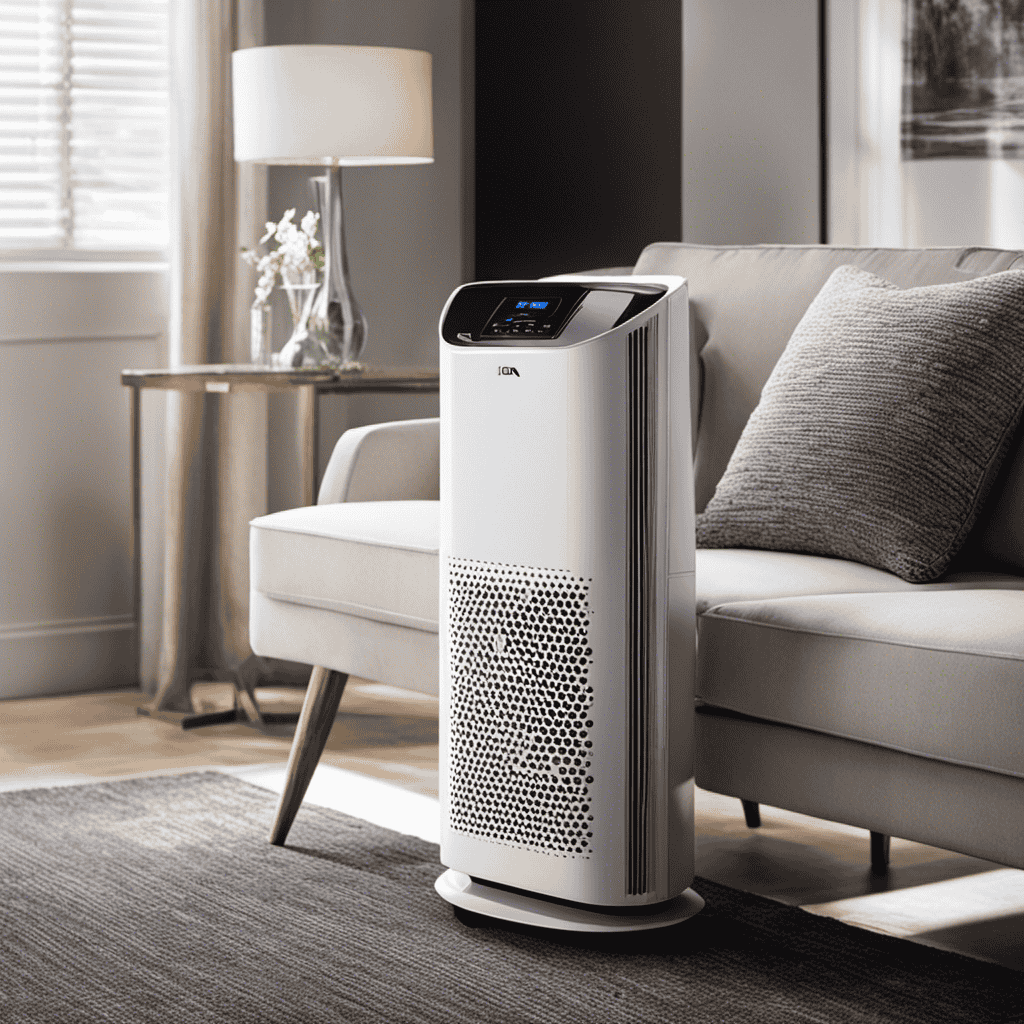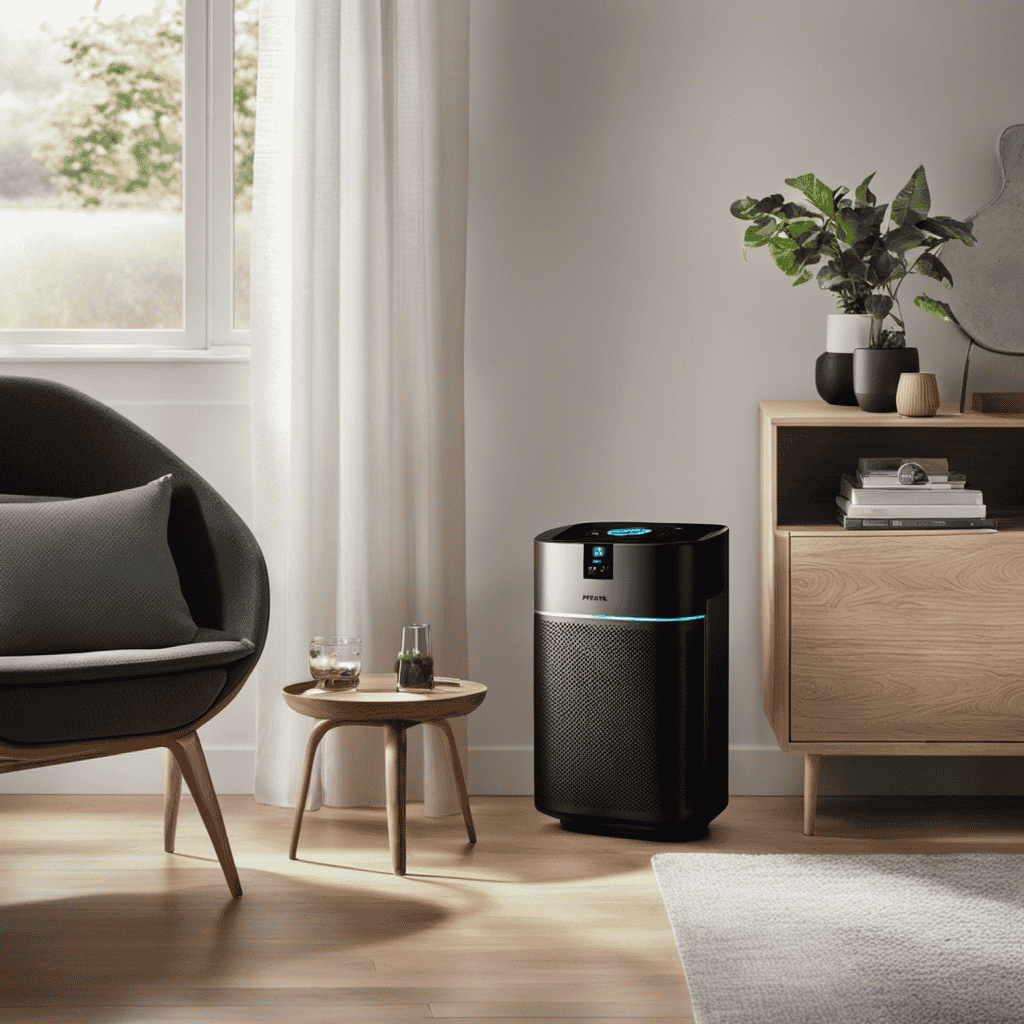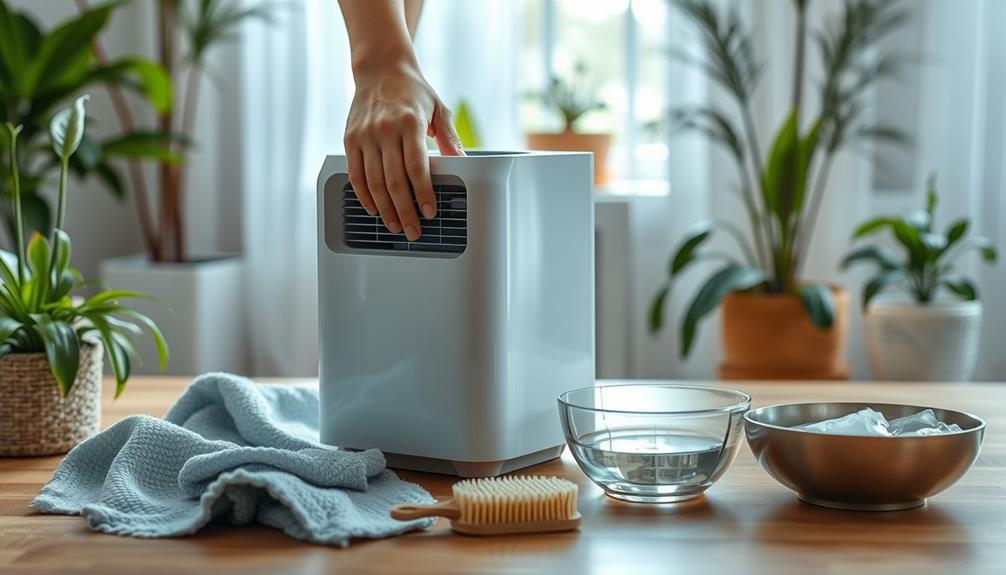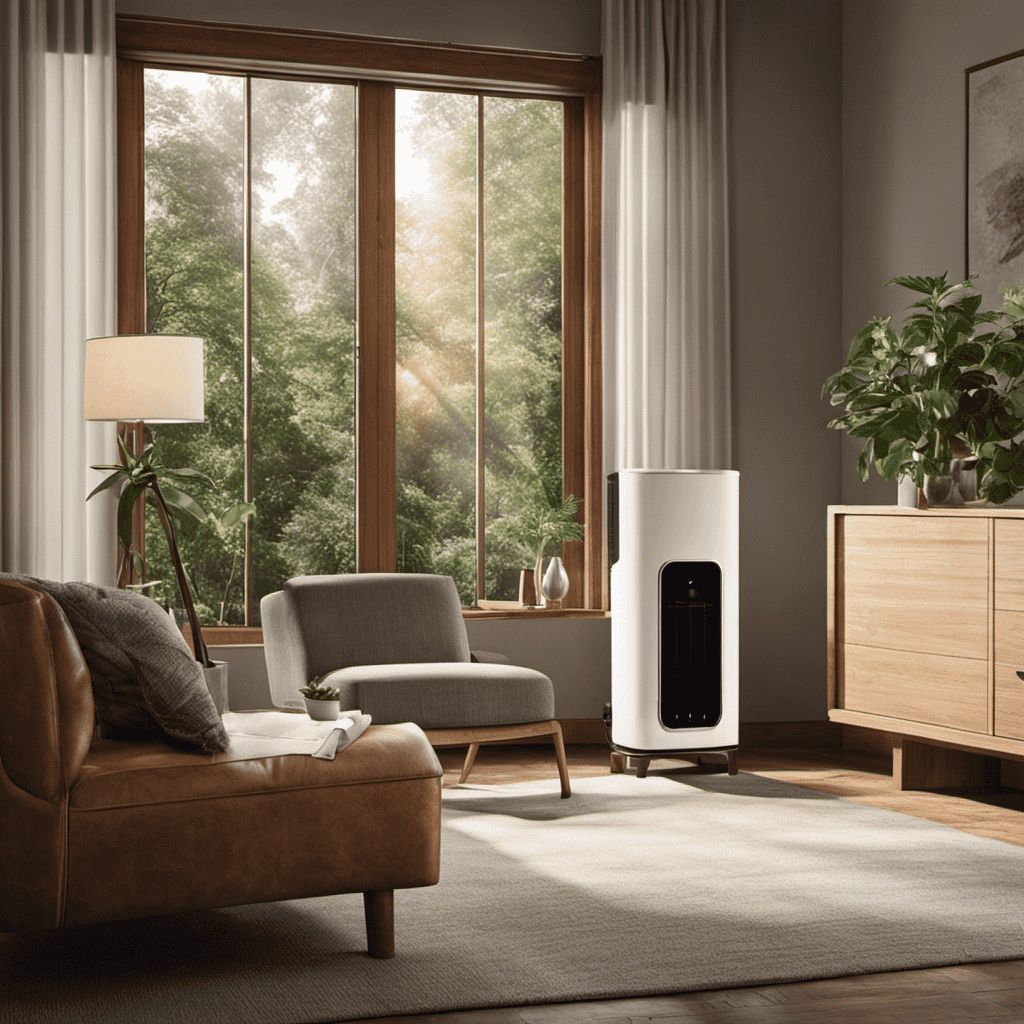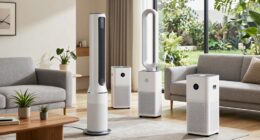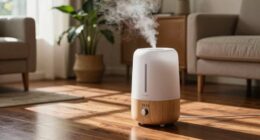As someone knowledgeable about air quality, I have seen the hidden risks that come with using a faulty air purifier. Picture this: a seemingly innocent machine softly buzzing in the background, unknowingly emitting harmful substances into the air you inhale. It’s a disturbing truth that often goes unnoticed.
In this article, we will delve into the alarming ways a malfunctioning air purifier can compromise your health and even prove fatal. So, join me as we uncover the hidden threats and understand why a faulty air purifier can be a silent killer.
Key Takeaways
- Ineffective trapping and removal of indoor pollutants can lead to poor indoor air quality and respiratory problems.
- Faulty air purifiers can release allergens into the air, triggering allergies and asthma attacks.
- Prolonged exposure to pollutants from a faulty air purifier can result in respiratory illnesses and other health issues.
- Investing in a defective air purifier can result in wasted money and the need for replacement.
The Dangers of a Defective Air Purifier
You need to be aware of the dangers that a defective air purifier can pose to your health.
One of the major risks lies in the faulty filters. When the filters are not working properly, they fail to effectively trap and remove indoor pollutants. This can lead to a buildup of harmful substances in the air, such as dust, allergens, mold spores, and even volatile organic compounds (VOCs).
Breathing in these pollutants can have serious health consequences, ranging from respiratory issues like asthma and allergies to more severe conditions like lung cancer.
Understanding the risks associated with faulty air purifiers is crucial in order to protect yourself and your loved ones. By ensuring that your air purifier is in good working condition and that the filters are regularly replaced, you can minimize the potential harm caused by indoor pollutants and breathe cleaner, healthier air.
Understanding the Risks Associated With Faulty Air Purifiers
It’s important to understand the risks that come with using a faulty air purifier. When it comes to air purifiers, there are a few key risks to be aware of:
-
Health Risks:
-
Ineffective Filtration: A faulty air purifier may not effectively remove pollutants and allergens from the air, leading to respiratory issues and worsening of existing conditions.
-
Release of Harmful Chemicals: Some defective air purifiers may release harmful chemicals into the air, posing a serious health risk to occupants.
-
Legal Implications:
-
Air Purifier Recalls: Defective air purifiers can lead to recalls by manufacturers, highlighting the potential dangers associated with their use.
-
Product Liability: If a faulty air purifier causes harm or injury, the manufacturer may be held legally responsible for damages.
Understanding these risks is crucial in ensuring the safety of your indoor environment.
However, the dangers of malfunctioning air purifiers don’t stop there. Let’s explore the hidden threats that can arise from using a faulty device.
The Hidden Threats of Malfunctioning Air Purifiers
Don’t overlook the potential dangers that can arise from using a malfunctioning air purifier. While air purifiers are designed to improve indoor air quality, a faulty device can actually contribute to hidden dangers and further indoor pollution. It is crucial to understand the risks associated with these devices to ensure the safety of your health and well-being.
One of the hidden dangers of malfunctioning air purifiers is the emission of harmful chemicals. If the purifier’s filters are not properly maintained or replaced, they can release pollutants back into the air. These pollutants can include volatile organic compounds (VOCs), ozone, or even bacteria and mold spores. Inhaling these substances can lead to respiratory issues, allergies, and other health problems.
Furthermore, a malfunctioning air purifier may not effectively remove indoor pollutants. This can be due to a variety of factors such as inadequate filtration or a malfunctioning fan. As a result, indoor pollution levels may remain high, increasing the risk of developing respiratory conditions and other health hazards.
Transitioning into the subsequent section about health hazards caused by defective air purifiers, it is important to recognize the potential harm these devices can pose to our well-being. Understanding the specific health risks associated with faulty air purifiers is crucial in order to make informed decisions about their use and maintenance.
Health Hazards Caused by Defective Air Purifiers
The emission of harmful chemicals from malfunctioning air purifiers can pose serious health hazards. When air purifiers malfunction, they can release pollutants such as volatile organic compounds (VOCs), formaldehyde, and ozone into the air we breathe. These pollutants can lead to various health issues, including respiratory problems, allergies, asthma attacks, and even long-term damage to the lungs and other organs.
It is important for consumers to be aware of the potential dangers associated with defective air purifiers and take necessary precautions. In some cases, these hazards have led to air purifier recalls, where manufacturers are legally obligated to take action to rectify the situation. Failure to comply with recall orders can result in legal implications for the company, as they may be held responsible for any harm caused to consumers. Therefore, it is crucial to stay informed about air purifier recalls and take appropriate measures to ensure the safety of your indoor air quality.
- VOCs: Volatile organic compounds are emitted as gases from certain solids or liquids and can cause short-term and long-term health effects.
- Formaldehyde: A colorless gas that is used in various products and can cause respiratory issues, eye irritation, and even cancer.
- Ozone: A gas that is harmful when inhaled and can cause throat irritation, coughing, chest pain, and shortness of breath.
How a Faulty Air Purifier Can Compromise Indoor Air Quality
To ensure the quality of the air you breathe indoors, it’s crucial to address any issues with a faulty air purifier. Proper air purifier maintenance is essential to ensure effective filtration and prevent common air purifier defects.
Regularly cleaning or replacing the filters, checking for any blockages, and ensuring proper ventilation are key steps in maintaining the optimal performance of an air purifier.
Common air purifier defects include malfunctioning motors, faulty sensors, and inadequate airflow. These defects can compromise the air purifier’s ability to remove pollutants, resulting in poor indoor air quality.
Using a defective air purifier can lead to a range of health issues, including allergies, respiratory problems, and even potential harm to vulnerable individuals such as children or the elderly. Therefore, it is crucial to address any issues promptly and seek professional assistance if needed.
The Potential Harm of Using a Defective Air Purifier
Using a defective air purifier can pose significant health risks. Defects in the purifier’s filtration system may result in the release of harmful pollutants into the air, compromising indoor air quality and potentially causing respiratory issues.
It’s important to take safety precautions when using a defective air purifier, such as ensuring proper ventilation and seeking professional assistance for repairs or replacement.
Health Risks of Defects
Avoiding a defective air purifier is essential for your health; it can potentially harm you. When it comes to the risks and consequences of using a faulty air purifier, there are several factors to consider. Here are some important points to keep in mind:
-
Risks and Consequences:
-
Inadequate Filtration: A defective air purifier may not effectively remove pollutants, leading to poor indoor air quality and respiratory problems.
-
Increased Allergens: Faulty purifiers can release allergens into the air, triggering allergies and asthma attacks.
-
Prevention Measures:
-
Regular Maintenance: Regularly clean and replace filters as recommended by the manufacturer to ensure optimal performance.
-
Quality Checks: Purchase air purifiers from reputable brands and suppliers to minimize the risk of defects.
Safety Precautions When Defective
When it comes to your safety, it’s important to be aware of the potential dangers associated with a defective device like an air purifier. Preventing accidents should be a priority, and this includes taking the necessary precautions when dealing with a faulty air purifier.
Firstly, it is crucial to properly dispose of the defective purifier. This can be done by contacting the manufacturer or a local recycling center to ensure that the device is handled safely and responsibly.
Additionally, it is important to avoid attempting any repairs or modifications on your own, as this can further exacerbate the risks associated with a defective unit.
By following these safety measures, you can help minimize the potential harm that a faulty air purifier may pose.
Now, let’s explore the link between faulty air purifiers and respiratory problems.
The Link Between Faulty Air Purifiers and Respiratory Problems
Faulty air purifiers can potentially cause respiratory problems. When air purifiers malfunction, they may not effectively filter out harmful particles and pollutants in the air. This can lead to an increased risk of respiratory illnesses such as asthma, allergies, and bronchitis. The long-term effects of breathing in these pollutants can be detrimental to our health.
Here are some key points to consider:
-
Exposure to Contaminants: Faulty air purifiers may not adequately remove pollutants such as dust, pet dander, and mold spores from the air we breathe, increasing our exposure to these harmful contaminants.
-
Reduced Indoor Air Quality: Poor air filtration can lead to a buildup of indoor pollutants, impacting the overall air quality in our homes and potentially exacerbating respiratory conditions.
-
Inadequate Ventilation: Malfunctioning air purifiers may not effectively circulate fresh air, leading to stale and stagnant indoor environments, which can further aggravate respiratory issues.
It is crucial to regularly maintain and monitor air purifiers to ensure their proper functioning and minimize the risk of respiratory problems.
Exploring the Dangers of Toxic Emissions From Malfunctioning Air Purifiers
As an expert in air quality, I want to shed light on the dangers of toxic emissions from malfunctioning air purifiers.
When air purifiers malfunction, they can release deadly emissions into the surrounding environment. These emissions can pose serious health risks, such as respiratory problems, allergies, and even long-term lung damage.
Deadly Emissions From Malfunctions
If your air purifier malfunctions, you could be exposed to deadly emissions. The consequences of such exposure can be severe, with potential long-term effects on your health.
Here are a few important points to consider:
-
Immediate dangers:
-
Carbon monoxide: A malfunctioning air purifier can release high levels of carbon monoxide, a colorless and odorless gas that can lead to dizziness, nausea, and even death.
-
Formaldehyde: Some air purifiers utilize chemicals like formaldehyde to neutralize pollutants. If released in excessive amounts due to a malfunction, formaldehyde can cause respiratory issues, eye irritation, and other health problems.
-
Long-term effects:
-
Particulate matter: Malfunctioning air purifiers might not effectively filter out particulate matter, which can lead to respiratory issues, cardiovascular problems, and even cancer.
-
Mold spores: If a malfunctioning air purifier fails to eliminate moisture effectively, it can contribute to the growth of mold, resulting in allergic reactions, asthma attacks, and other respiratory complications.
It is crucial to regularly maintain and monitor your air purifier to ensure its proper functioning and prevent any potential deadly emissions.
Health Risks of Malfunctioning Purifiers
In my previous explanation of the deadly emissions from malfunctioning air purifiers, I discussed how these devices can release harmful substances into the air, posing a serious threat to our health.
Now, let’s delve into the specific risks and health consequences associated with using defective air purifiers.
When a purifier malfunctions, it may not effectively filter out pollutants and allergens from the air. This means that harmful particles such as dust, pollen, pet dander, and mold spores can remain in the environment, leading to increased exposure and potential health issues.
Prolonged exposure to these contaminants can trigger respiratory problems, worsen allergies, and even exacerbate conditions like asthma, resulting in frequent coughing, wheezing, shortness of breath, and chest tightness.
Understanding the risks and health consequences of malfunctioning air purifiers is crucial for protecting ourselves and our loved ones. With this knowledge, we can take appropriate measures to ensure the air we breathe is clean and safe.
Now, let’s explore the role of defective air purifiers in exacerbating allergies and asthma.
The Role of Defective Air Purifiers in Exacerbating Allergies and Asthma
Defective air purifiers can actually worsen allergies and asthma symptoms. When these devices malfunction, they fail to effectively filter out allergens and irritants from the air, leading to increased exposure risks for individuals with respiratory conditions. The long term effects of using a faulty air purifier can be detrimental to one’s health.
Here are two important points to consider:
-
Inadequate filtration: Malfunctioning air purifiers may not properly capture and remove allergens, such as pollen, dust mites, and pet dander, from the air. This can result in continuous exposure to these irritants, triggering allergies and asthma symptoms.
-
Reduced airflow: Defective air purifiers may have impaired airflow due to clogged filters or faulty fans. This can lead to poor ventilation and the accumulation of indoor pollutants, exacerbating respiratory issues and potentially causing long term damage to the lungs.
It is crucial to ensure that your air purifier is functioning properly to effectively manage allergies and asthma symptoms and maintain a healthy indoor environment.
The Importance of Regular Maintenance to Prevent Air Purifier Defects
To prevent potential issues with your air purifier, it’s crucial that you regularly maintain and service the device. Regular maintenance benefits both the efficiency and longevity of your air purifier, ensuring that it continues to effectively remove harmful pollutants from your indoor air.
By regularly cleaning or replacing the filters, you can prevent dust, allergens, and other particles from clogging the system, which can lead to reduced airflow and decreased performance.
Additionally, regular maintenance allows you to identify and address any potential defects or malfunctions in the air purifier early on. This proactive approach can help prevent more serious issues, such as electrical failures or motor damage, which could render the device ineffective or even pose safety risks.
Identifying Warning Signs of a Malfunctioning Air Purifier
Regular maintenance is essential for ensuring that your air purifier continues to function properly and effectively removes harmful pollutants from your indoor air. However, even with regular maintenance, there may be times when your air purifier malfunctions.
It is important to be able to identify common malfunctions so that you can take the necessary steps to fix them. Here are some warning signs to look out for:
- Strange noises: If your air purifier starts making unusual sounds, such as rattling or grinding, it could indicate a malfunctioning motor or fan.
- Weak airflow: If you notice that the airflow from your air purifier has significantly decreased, it could be a sign of a clogged filter or a problem with the fan.
- Error codes: Many modern air purifiers come with built-in error codes to indicate malfunctions. If you see any error codes on your air purifier’s display, consult the user manual for guidance.
When you suspect a malfunction, follow these steps:
- Check the power source: Make sure your air purifier is properly plugged in and receiving power.
- Clean or replace filters: A clogged or dirty filter can hinder the performance of your air purifier. Clean or replace filters as recommended by the manufacturer.
- Contact customer support: If the issue persists or if you are unsure about how to fix the malfunction, reach out to the manufacturer’s customer support for assistance.
Frequently Asked Questions
How Do I Know if My Air Purifier Is Defective?
If you’re wondering if your air purifier is defective, there are a few signs to look out for. Reduced performance, strange noises, or a burning smell are indications that it may not be functioning properly.
Can a Defective Air Purifier Release Harmful Chemicals Into the Air?
Yes, a defective air purifier can release harmful chemicals into the air. It is important to regularly maintain your air purifier to prevent common defects that can lead to the release of these chemicals.
Are There Any Specific Models or Brands of Air Purifiers That Are More Prone to Defects?
Some air purifiers may have defects that compromise their safety features. It is important to research and choose reputable brands that have a track record of reliability and minimal reports of common air purifier defects.
Can a Defective Air Purifier Worsen Existing Respiratory Conditions?
Yes, a defective air purifier can worsen respiratory conditions. It can release harmful pollutants and allergens into the air, leading to increased symptoms and potential risks for individuals with respiratory issues.
What Steps Can I Take to Prevent My Air Purifier From Becoming Defective?
To prevent my air purifier from becoming defective, I ensure regular air purifier maintenance. This includes cleaning the filters, checking for any leaks or malfunctions, and following the manufacturer’s guidelines. By doing so, I can avoid common air purifier issues.
Conclusion
In conclusion, it’s imperative to recognize the potential dangers of a defective air purifier. By compromising indoor air quality, emitting toxic substances, and exacerbating allergies and asthma, these malfunctioning devices pose a significant threat to our health.
Regular maintenance and vigilance are crucial in preventing air purifier defects. As the saying goes, ‘A stitch in time saves nine.’ Taking proactive measures to address any warning signs and ensuring the proper functioning of our air purifiers is vital for the well-being of ourselves and our loved ones.
